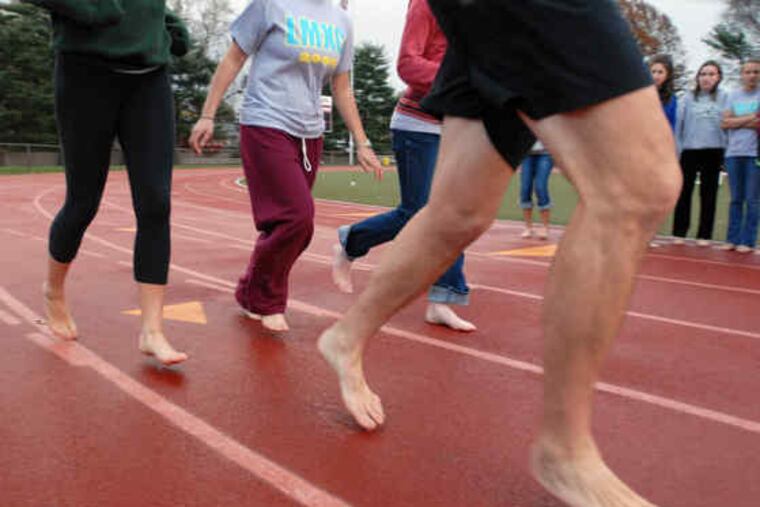What caused tingling and numbness in a teen’s feet? | Medical Mystery
A teen runner with 2 weeks of tingling in her feet and one day of numbness could barely walk, let alone run, with these symptoms.

A 17-year-old girl presented to her primary care provider (PCP) with 2 weeks of tingling in her feet and one day of numbness. This caused her great distress as she was an avid runner; she could barely walk, let alone run, with these symptoms.
A few months earlier, she had increased her training by logging extra hours on the track to improve her times and lifting heavier weights in the gym to strengthen her muscles. She told her PCP, “I want to run in college next year but it’s never going to happen if my feet keep feeling like this.” Her PCP was determined to address the cause and get her back to peak running performance.
What could be causing her symptoms?
The patient dramatically increased her fitness training – could her symptoms have been due to overuse injuries? Teens are more prone to overuse injuries due to rapid growth spurts that can create extra muscle and tendon tension. She did not have pain when the PCP examined her feet, making an overuse injury unlikely.
Since the teenager was lifting heavier weights at the gym, it was possible that she could have injured her back causing spinal cord compression. An x-ray of her back was normal, and she would need an MRI of her back to evaluate for compression. Something to consider if all else failed to make the diagnosis.
Another consideration was Raynaud’s Syndrome. Raynaud’s is a condition that causes cold, tingly, numb, or painful fingers and/or toes. With Raynaud’s, blood vessels constrict, so less blood gets to the affected area and skin color can change to blue, purple, and/or red. The patient told us she looked at her feet when she had symptoms and her skin looked normal.
Peripheral neuropathy is a condition where nerves outside of the brain and spinal cord (peripheral nerves) are damaged. It can cause pain, tingling, numbness, and weakness in the extremities. There are multiple causes of peripheral neuropathy including Guillain-Barré Syndrome (GBS). GBS is an autoimmune disorder that results from antibodies mistakenly attacking the peripheral nerves. GBS can lead to paralysis and, if it affects the chest muscles, can lead to difficulty breathing, requiring a ventilator. GBS often follows a respiratory or gastrointestinal infection. The patient did not report a recent infection. She also did not have one of the signs of GBS — loss of deep tendon reflexes in her ankles.
On further questioning, the teen also said she had been feeling fatigued and weak. These muscle symptoms could be due to her recently increased training. On the other hand, the PCP wondered about hypothyroidism, a condition where the thyroid gland does not make enough thyroid hormone. Peripheral neuropathy associated with hypothyroidism may be caused by fluid retention and swollen tissues that compress nerves. The most common cause of this thyroid issue in teens is Hashimoto Thyroiditis, in which antibodies attack the thyroid gland. But the teen’s thyroid function tests were normal.
Solution
The clue to the patient’s diagnosis came from discussing her diet: two years prior, she adopted a vegan diet because of her animal rights and environmental concerns. The patient tried to eat well-balanced meals and snacks, but she did not know that vegans often need supplemental vitamin B12, a vitamin found mainly in animal products. In her case, lab tests revealed that her vitamin B12 level was low, a deficiency that affects the protective coating around nerves, leading to peripheral neuropathy. Vitamin B12 deficiency can be treated through oral supplementation or intramuscular injections. To prevent her from developing this again, she will need to take a multivitamin and eat foods that are fortified with vitamin B12 including nondairy milks and yogurts, tofu, and nutritional yeast.
Our Advice
1: When a teenager makes a significant dietary change, it is important to speak with a PCP and/or a dietician to determine whether supplements may be necessary. This is especially true for vitamins B12 and D3. The daily Recommended Dietary Allowance (RDA) for teenagers aged 14-18 years are:
2: Don’t allow your teen to try to ‘run through’ pain. In this case, the patient continued to exercise excessively until she had trouble walking. Bring symptoms to your PCP to make sure they don’t signal a serious problem.
Luckily, the teen’s symptoms were reversible. She made it to the Penn Relays and placed in the 800-meter event.
Rachel Knapp is a pediatric resident and Rima Himelstein is an adolescent medicine specialist at Nemours’ Children’s Health, Delaware.